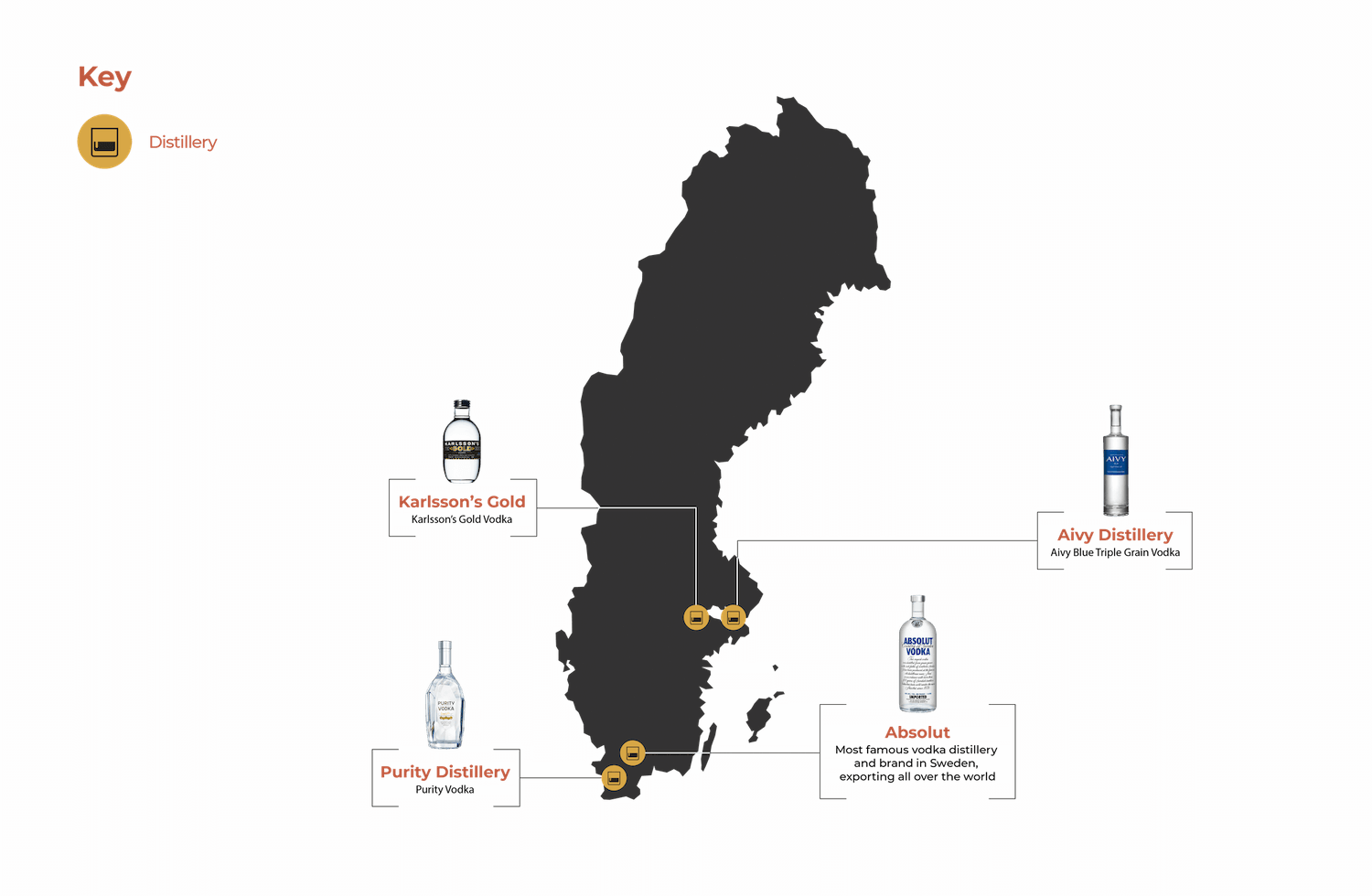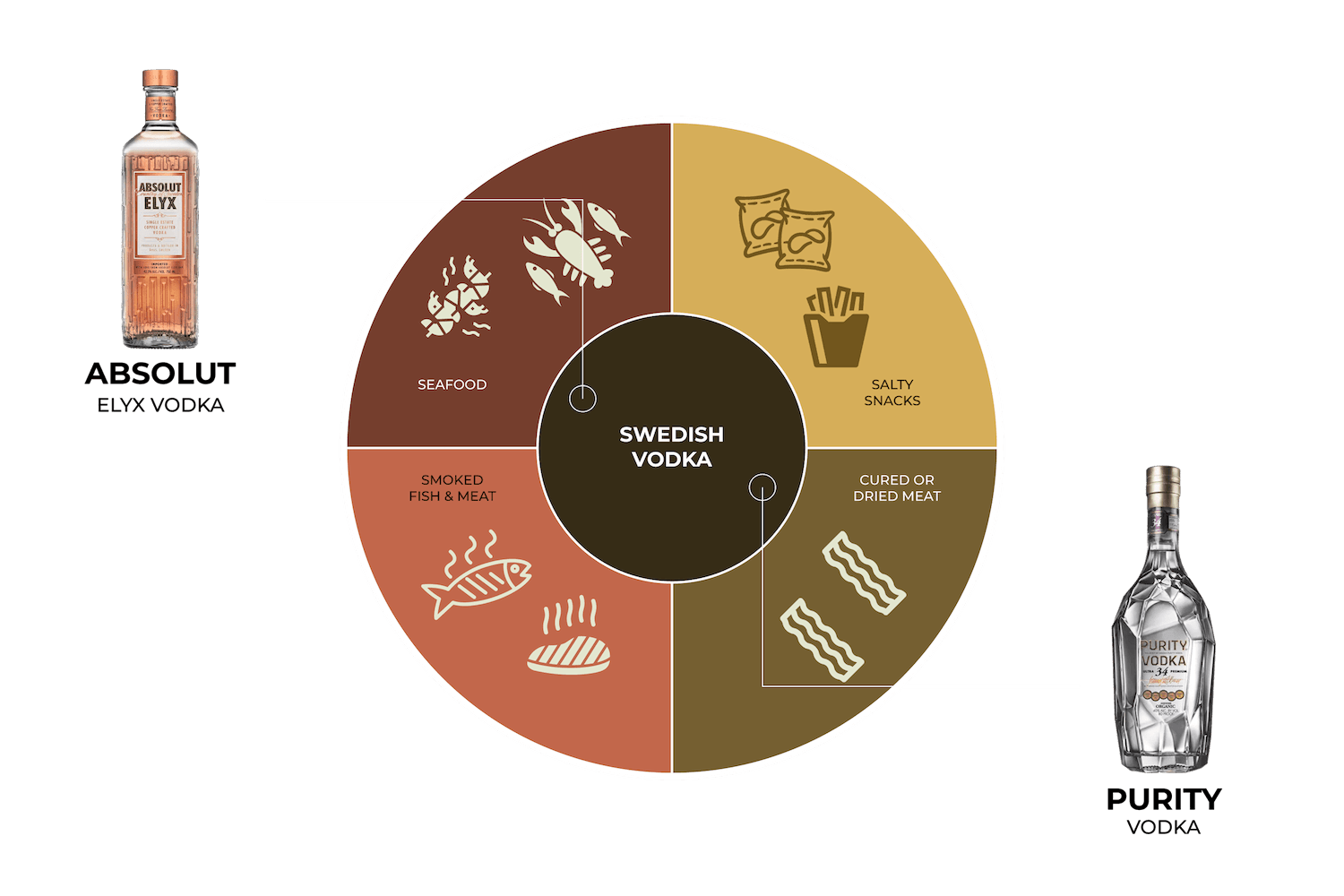Although Sweden first began making vodka around the 15th Century, it wasn’t until the late 18th Century that production really picked up and methods of distillation improved.
Now, Swedish vodka, and Sweden in general, is synonymous with the Absolut vodka brand and it is difficult to find a bar anywhere in the world that doesn’t have a bottle by the brand on its shelf.
It was common, until recently, for most vodka distilleries in the Scandanavian nation to produce bottles of vodka made from potato, however, distilleries now often use grains, such as wheat, instead.
Absolut, for example, uses winter wheat grown around the southern Swedish town of Åhus, and other distilleries across the country have begun offering more premium bottles of Swedish vodka that are made to be consumed more on their own rather than blended into a cocktail or mixed drink, which is often the case with the standard Absolut vodka.
Sweden has a lot to offer the intrepid vodka explorer thanks to a number of premium brands having opened up in recent times who have collected a range of international spirit and other liquor awards.
For more on the history of the drink in Sweden, consider both of these articles.
It goes without saying that the biggest name in Swedish vodka is the Absolut vodka brand, now owned by the French liquor conglomerate Pernod Ricard.
Everything else about the quintessential vodka brand is Swedish, with all of the materials used in production being sourced from around the small Southern Swedish town of Åhus, and Absolut remains one of the most successful distilled spirits globally to date.
Outside of Absolut, other prominent brands include Purity vodka, which is distilled out of a 13th Century Southern Swedish castle from a blend of barley and wheat and is known for its exceptionally smooth taste and premium quality, Karlsson’s Gold, which is distilled once and made exclusively with Swedish potatoes for a richer flavour experience, and finally, Aivy vodka, who produce a wheat-based triple-distilled vodka that is unusually flavoured with three ingredients, including mint, strawberries, and pears for a refreshing summer drink.
Beyond these, and thanks to a globally increasing trend, a multitude of smaller distilleries are opening up across the country that are producing a growing number of craft and small batch vodkas and other spirits, making Sweden an exciting place to look when attempting to find exciting new vodkas.
Swedes, being a part of the so-called “vodka belt” that extends right across Eastern Europe, typically prefer to enjoy their vodka neat, chilled, or over ice and generally make their vodka to a high enough degree of quality in order to make this possible.
Whilst Absolut gained their fame by producing a world-renowned cocktail-friendly vodka, other bottles by the brand, such as the Absolut Elyx, are representative of a premium vodka designed to be had on its own rather than mixed away into a cocktail.
Other premium examples, including Karlsson’s Gold, can also be enjoyed neat or over ice and consumers are actively discouraged from using these higher quality bottles in a cocktail as the subtle flavours can be blended away and overcome by combining them with a mixer.
If forced to consume a lower quality vodka bottle, however, it is often best to freeze chill the bottle before pouring as this increases the viscosity, or texture, of the liquid inside and helps to reduce the prevalence of any unpleasant flavours or aromas from the spirit.
When choosing to use Swedish vodka as a cocktail base, the multitude of flavours offered in the Absolut range and interesting blend of ingredients utilised by the Aivy brand, make it possible to create some exquisitely flavoured mixed drinks.
Absolut Lime, for example, can be used in a classic Vodka & Soda for a highly refreshing citrus twist to a popular vodka staple, and the Aivy White Label can be combined in the Aivy Caipiroska to craft an exceedingly vibrant fruit-laden summer cocktail.
Pairing food with Swedish vodka can be done in much the same way as vodka made in other parts of Eastern Europe, and indeed, across the world.
When looking to pair unflavoured vodka with food, be sure to consider the distillate used as this can greatly affect the resulting flavour profile of the vodka.
As a general rule though, vodka pairs well with many smoked or cured meats and fish, pickles, salty snacks, and seafood dishes, as the flavours from these foods pair well with the often light spice, citric, or heat flavours present in many vodkas.
All over the world, the craft revolution has taken control. In this deep dive guide, we shine some light on what’s happening in the world of craft vodka in Australia.
Looking to spruce up your mixing game? We’ve put together a quick guide on which of the common supermarket mixers work best with some of your favourite spirits.
Noticed some new products at your local bottle shop? At least some of these are bound to be hard seltzers, the latest drinks craze to sweep the nation.

